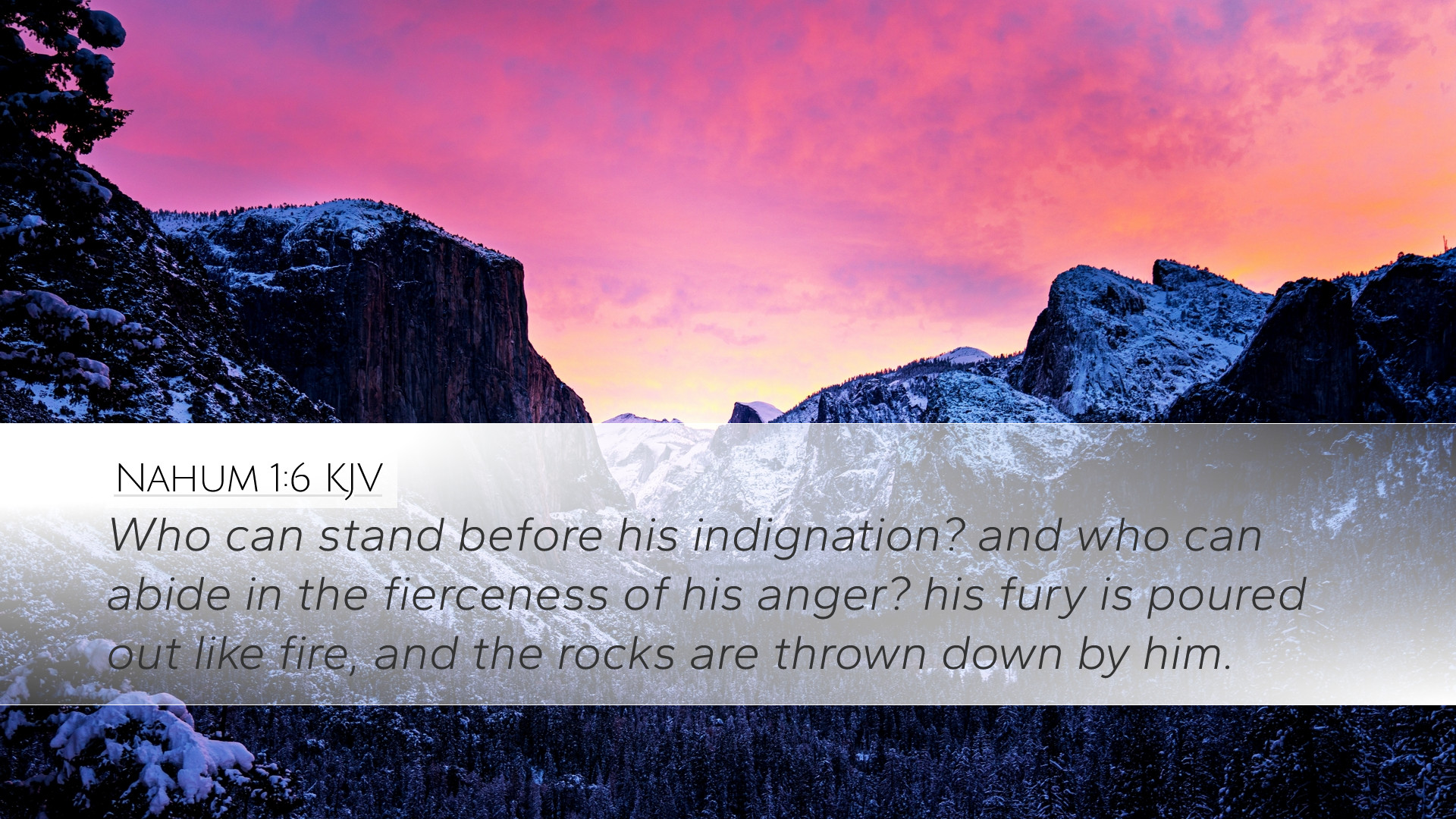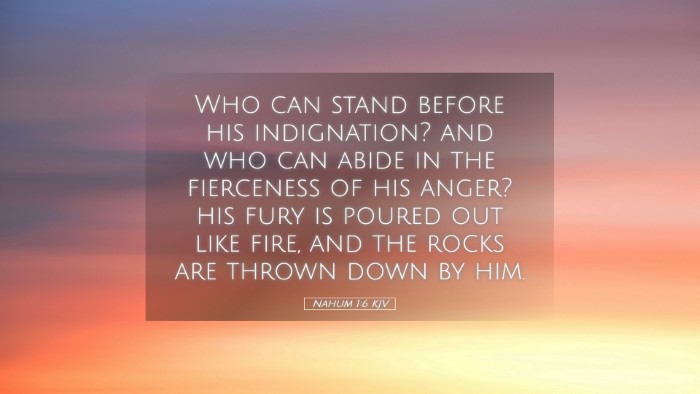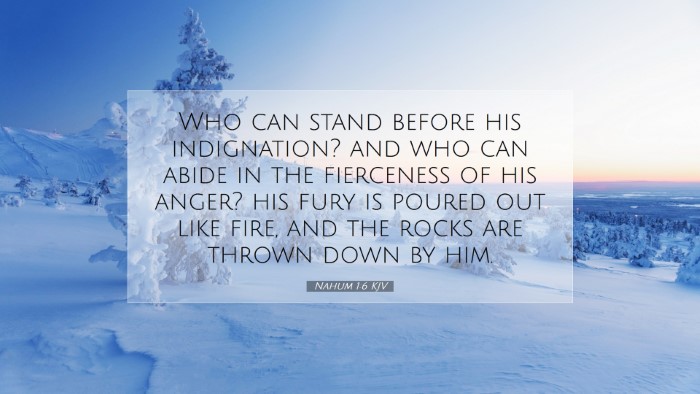Old Testament
Genesis Exodus Leviticus Numbers Deuteronomy Joshua Judges Ruth 1 Samuel 2 Samuel 1 Kings 2 Kings 1 Chronicles 2 Chronicles Ezra Nehemiah Esther Job Psalms Proverbs Ecclesiastes Song of Solomon Isaiah Jeremiah Lamentations Ezekiel Daniel Hosea Joel Amos Obadiah Jonah Micah Nahum Habakkuk Zephaniah Haggai Zechariah MalachiNahum 1:6
Nahum 1:6 KJV
Who can stand before his indignation? and who can abide in the fierceness of his anger? his fury is poured out like fire, and the rocks are thrown down by him.
Nahum 1:6 Bible Commentary
Commentary on Nahum 1:6
Nahum 1:6 states: "Who can stand before His indignation? And who can endure the heat of His anger? His fury is poured out like fire, and the rocks are broken in pieces by Him." This verse succinctly captures the formidable nature of God’s wrath and serves as a powerful reminder of His sovereignty and justice. Below, we elaborate on this verse by synthesizing insights from notable public domain commentaries.
The Nature of God’s Indignation
Matthew Henry remarks that the phrase “indignation” indicates God’s righteous anger, which is provoked by sin and rebellion against His holy character. Henry emphasizes that God's anger is not arbitrary but is a direct response to injustice, idolatry, and immorality, particularly in nations like Assyria who have oppressed God’s people.
This indignation of the Lord is contrasted with His mercy, reminding us that while He is loving and kind, He is also just and cannot overlook transgressions. In this context, Henry points out that the verse serves as a call to repentance, challenging both individuals and nations to recognize the severity of their actions.
The Inescapability of God’s Judgment
Albert Barnes provides insight into the rhetorical questions posed in the verse: “Who can stand before His indignation?” Barnes interprets this as a declaration of God’s supreme authority and the futility of attempting to withstand His judgment. He elaborates that no human power or wisdom can shield anyone from the consequences of divine wrath when it is fully expressed.
This creates a sense of urgency for all to consider their standing before God, as Barnes points out that even the mightiest earthly leaders are ultimately powerless against His judgment. He stresses the importance of humility and fear of God, as resisting His will can lead to dire consequences.
The Imagery of God’s Fury
Adam Clarke adds a rich layer of understanding by exploring the metaphorical language used in this verse. He notes that describing God’s fury as being “poured out like fire” evokes an image of uncontrollable and consuming power. Clarke also highlights that fire, in biblical literature, often symbolizes purification, judgment, and destruction.
Clarke suggests that the reference to "the rocks are broken in pieces" signifies how even the strongest elements of creation cannot withstand God’s might when His wrath is unleashed. This imagery emphasizes God’s omnipotence and serves as a sober warning of the destructiveness of divine judgment, particularly towards those who oppose Him.
The Holiness of God
Another aspect that emerges from the commentaries is the holiness of God. Matthew Henry notes that God's anger is rooted in His holiness, which cannot tolerate sin. This connection leads to a higher understanding of why God reacts with such indignation - His very nature compels Him to uphold justice and maintain the order of creation.
Moreover, Albert Barnes reinforces that understanding God’s wrath as a reflection of His holiness is crucial for a robust theological framework that encompasses both His love and His justice. This balance is essential for proper worship and theological reflection, allowing individuals to appreciate the fullness of God's character.
Applications for Believers
In consideration of the insights provided, it is crucial for contemporary believers to grasp the weight of Nahum 1:6. The call to recognize God's majesty and the seriousness of His judgment challenges us to live out our faith authentically and righteously. It prompts reflection on areas where we may fall short of His glory and encourages a daily commitment to alignment with His will.
- Repentance: Recognizing God’s potential wrath should lead to a state of humility and repentance in the hearts of believers.
- Advocacy for Justice: Understanding God's commitment to justice should motivate believers to advocate for righteousness in their communities.
- Awe and Reverence: This passage calls for a proper attitude of awe and reverence toward God, shaping our worship and daily living.
Conclusion
In Nahum 1:6, we encounter profound truths regarding the nature of God's wrath and justice. The combined insights from public domain commentaries encourage a deeper understanding of God's character as both loving and just. For pastors, students, and theologians, this verse serves as a vital reminder of the need to proclaim God’s justice while also inviting sinners to experience His mercy. As we study and reflect on God's Word, may we be ever mindful of the seriousness of His righteousness and the urgency to live in a manner that honors Him.


